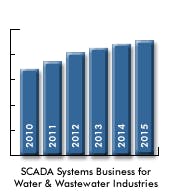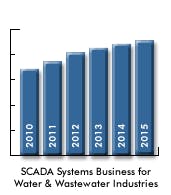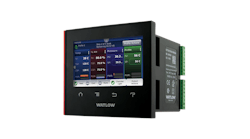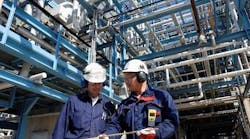The latest SCADA systems encompass a new generation of technology components, says ARC. “The current SCADA market also reflects the impact of new technology on SCADA components and cost-effective communications for knowledge transfer,” says Analyst Allen Avery, principal author of ARC’s “SCADA Systems for the Water & Wastewater Industry Worldwide Outlook,” in a prepared statement. “SCADA components are easier to integrate and provide vastly improved capabilities and functionalities, and communications are no longer limited. End users are utilizing SCADA technology for a range of operational improvement applications and linking these to business processes for a variety of purposes, both internal and external to the enterprise.”
Having analyzed the SCADA market by geographic region, project size, and component type, including hardware, software, and services, ARC says the underlying technology that facilitates traditional SCADA functionality has changed dramatically. For water utilities, ARC found emerging technology is enabling SCADA to be tightly integrated to the domain of business processes, creating an improved value proposition for its usage. ARC also says that SCADA systems bring improved performance to geographically dispersed assets and provide a framework for real-time performance management on a regional, or even global, basis. The water utility infrastructure is expected to utilize the enhanced functionalities of SCADA to improve its core business processes.
ARC found the water and wastewater industries in developed regions are using SCADA as a core technology to support new business processes in response to changing industry dynamics and the need for large-scale upgrades of existing infrastructure. Infusion of newer SCADA technology can optimize the required level of capital expenditures for improved sustainability and upgrades of aging infrastructure. Developing regions are looking to either upgrade or install new water and wastewater treatment and distribution systems and SCADA is used to link these geographically separated facilities.
ARC predicts SCADA will be at the core of technology adoptions as the industry moves through uncertain economic climates to improve business processes to meet the growing demand and economic challenges that privatization and public-private partnering of the industry requires. ARC also says suppliers must develop a SCADA system capable of being fully integrated with corporate business systems. These systems include technologies such as geographic information systems (GIS) and asset management programs. In order to be competitive, ARC says suppliers will have to show how their SCADA system can provide real-time data to meet both present and future demands of all stakeholders involved with the operation of water utilities.
For more information on the “SCADA Systems for the Water & Wastewater Industry Worldwide Outlook” study, click here.



